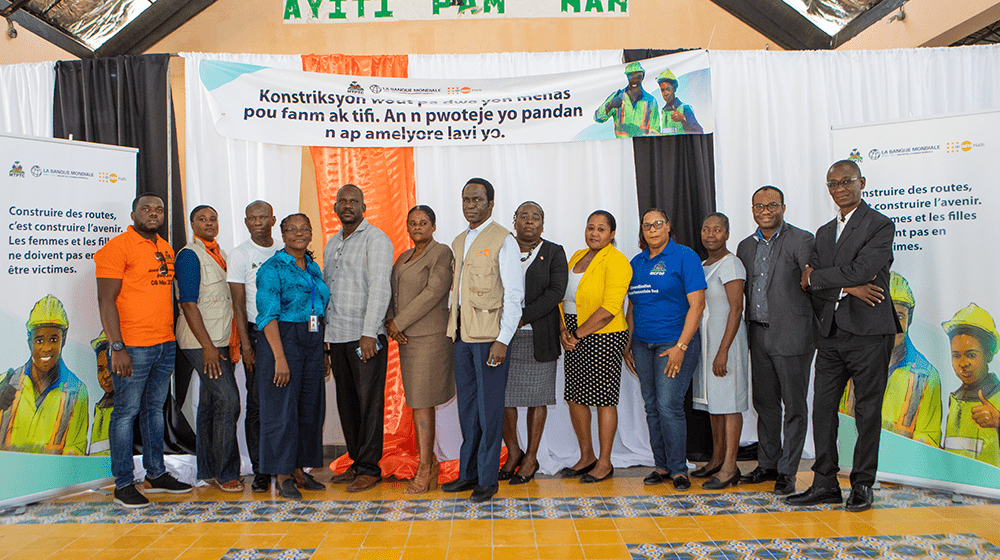Port-au-Prince, April 7, 2022 --- The Ministry of Public Works, Transportation and Communications launched on March 23, 2022, in Les Cayes, the project called “Strengthening the protection and resilience of communities in areas where roads infrastructure are being expanded in the Deep South, in the fight against gender-based violence and sexual exploitation and abuse”.
This project is funded by the World Bank for 1,019,789 dollars. It will cover three departments and last until June 30, 2023:
18 communes in 3 departments
The South, in 8 communes: Fond-des-Blancs, Côteaux, Roche-à-Bateaux, Port-à-Piment, Chardonnières, Cavaillon, Fonds-des-Nègres and Aquin
Nippes, in 4 communes: Baradères, Petit-Trou-de-Nippes, Petite-Rivière-de-Nippes and l’Asile,
The South-East in 6 communes: Thiotte, Anse-à-Pitres, Marigot, Bainet (or, precisely, Tikita, its second communal section), Belle-Anse and Côtes-de-Fer.
The project targets 33,586 beneficiaries, including women and girls at risk or survivors of gender-based violence, sexual exploitation and abuse, according to Taina Camy, UNFPA Project Manager.
Implementation
According to Eveline Larrieux, the Head of Gender Issues at the MTPTC’s Central Implementation Unit (UCE), under the PARR (Rural Accessibility and Resilience Project in Haiti), UNFPA will be the implementation partner for the actions planned to assist potential women and girl survivors of violence in the project’s 18 intervention communes located in the South, Nippes and Southeast Departments.
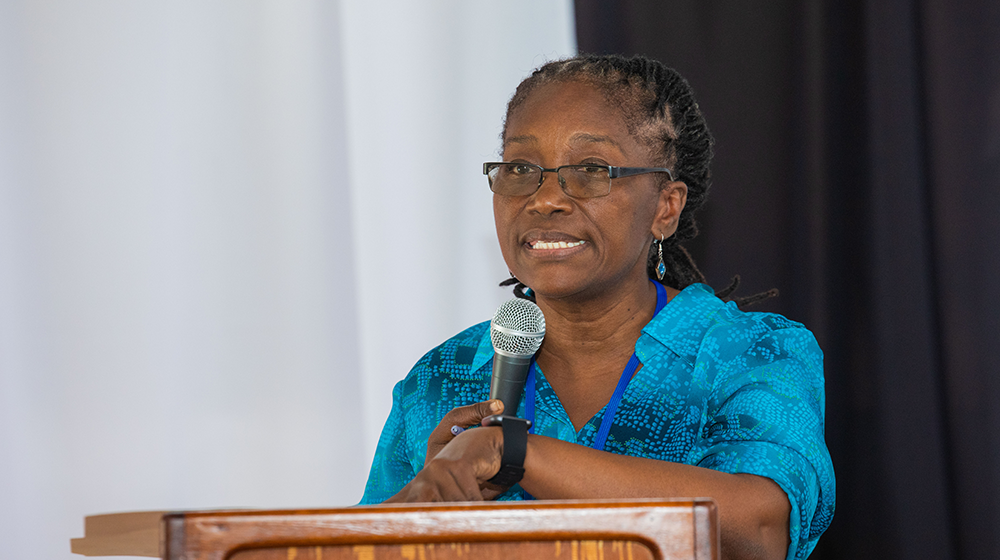
The UCE relies on this partner so that women and girls in these 18 intervention communes are equipped to prevent gender based violence in the communities, according to her.
Mobilized communities
The UCE hopes that communities will be mobilized to identify any potential acts of violence in the communities or construction sites, that they will join in reporting cases of violence against women and girls, and that survivors will be referred to multidimensional services to which UNFPA will facilitate access in the communities according to survivors’ needs.
The multisectoral services, such as reception, social, medical and legal support established by the Haitian Government in the intervention communities of the PARR infrastructure projects, within the scope of MTPTC’s UCE partnership with UNFPA, are an expression of the commitments taken by the Haitian Government before the family of nations, as emphasized by Larrieux.
Respect for women’s rights on construction sites
The UCE hopes that the firms and technicians on the site will respect the rights of women workers, once they have the skills to do the work. Community women and girls have the right to live in communities free of violence.
Sparing no effort
The Minister of Women’s Affairs and Women’s Rights, Sofia Loréus, invites everyone to spare no effort to achieve the set objectives. This is about strengthening the capacities of women and girls for an effective fight against violence against women and girls in the community, according to MCFDF’s Southern Coordinator who spoke on her behalf.
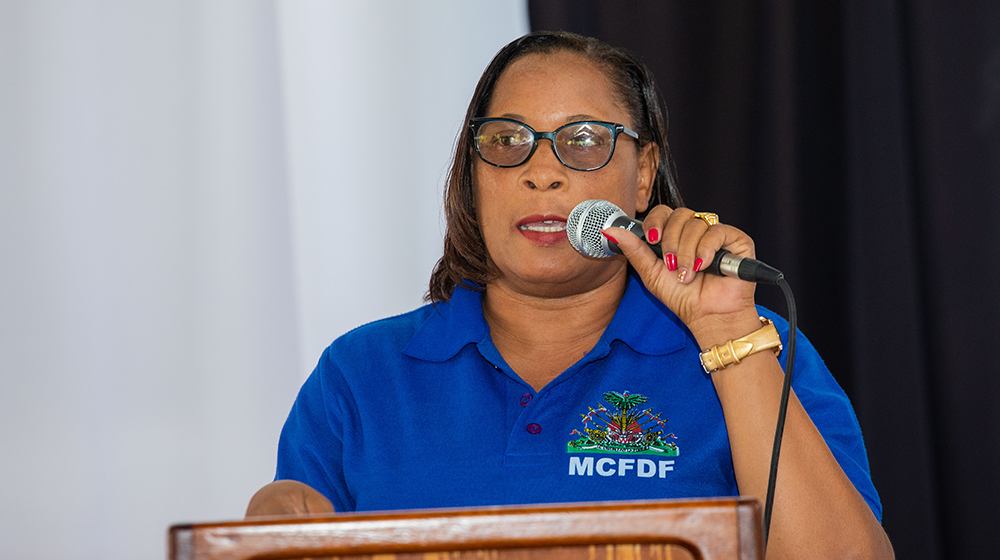
It is also about defining and practicing the complaint and community feedback mechanisms that will be put in place to denounce, confidentially report and follow up on any situation of misconduct, adds Dichlie Sylvain.
She invites the beneficiaries and community to cultivate the practice of reporting cases of gender-based violence. This is the way to overcome this phenomenon.
No to violence
In Haiti, 30% of women and girls aged 15 to 49 are victims of physical violence. 34% of women in couples are victims of domestic violence. 37% of cases of violence result in serious injuries. But few women are willing to break the silence about this, for fear of reprisals.
Achieving SDGs
According to the UNFPA Representative in Haiti, Saidou Kabore, the 2030 Sustainable Development Goals (SDGs) will not be achieved if, everywhere in the world, and especially in Haiti, we do not take women’s rights into account.
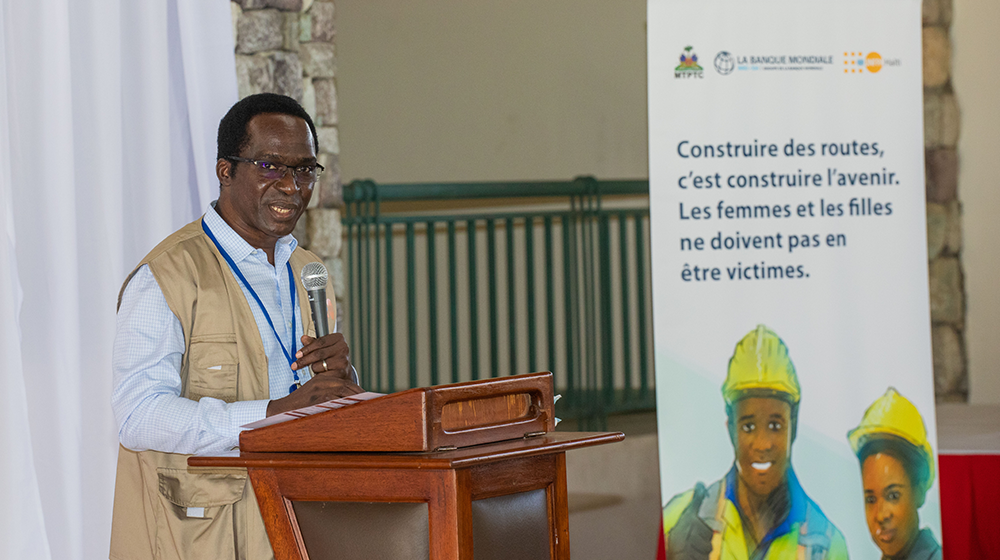
He recalled this testimony of domestic violence: “When he was hitting me, my son told him, ‘Daddy, stop!’ Since he was young, he would stand next to me, having no clue about what was going on. But he would still tell his father not to hit me”.
Saidou Kabore commends MTPTC and MCFDF for ensuring that the road construction project takes women into account.
“Building roads is building the future. But you don’t build the future if you don’t take women and girls into account,” he adds.
As the ceremony slogan states: “No man will live in peace if women do not live in peace, if women do not live without violence”.
The United Nations’ renewed commitment
The UNFPA Representative reaffirms the commitment of the UN system – UNICEF, UN Women, all UN agencies – alongside MTPTC and the World Bank as well as MCFDF to ensure that the construction of these roads is not negatively impacted by predatory actors who will abuse girls and women and thus block the future of this region.
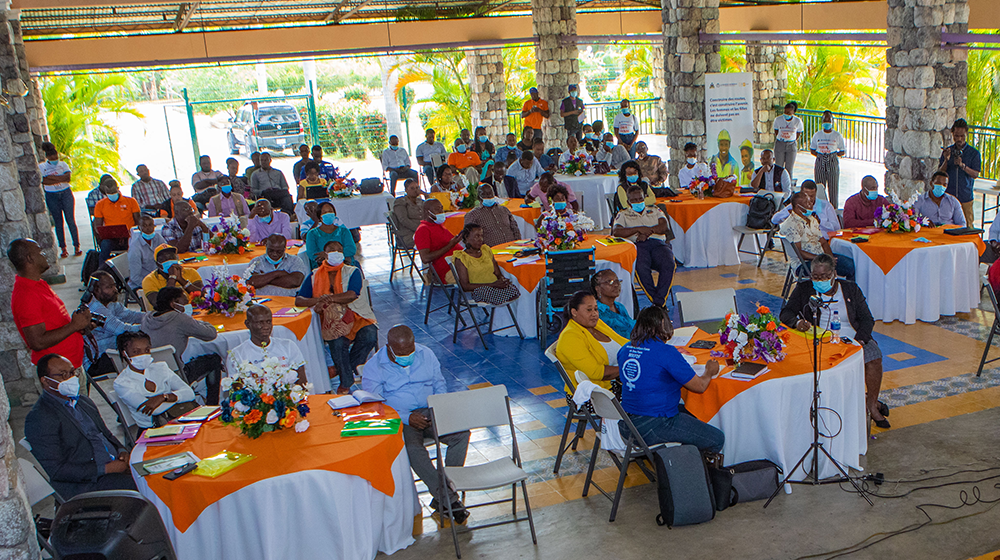
For professionalization
The Mayor of Les Cayes, Marie Michèle Sylvie Rameau, advocates for the professionalization of girls and women. “To strengthen their resilience, they must become qualified professionals”.
Government and NGOs
This project supports the Government’s policy, especially that of the Ministries of Public Works, Women’s Affairs, Public Health, Justice, Social Affairs, and the Office of the Secretary of State for the Integration of People with Disabilities.
Non-governmental organizations with community roots and experience in managing cases of gender-based violence are also involved in this project. These include “Solidarite Fanm Dayiti" (SOFA) and the URAMEL consortium which includes Kay Fanm and Fanm Deside.
The project’s launching ceremony took place in the presence of about one hundred people, including representatives of government entities, local authorities, United Nations agencies, community-based organizations, members of women’s organizations, youth and adolescents.
Text: Vario Sérant
Picture: Ralph Tedy Erol

